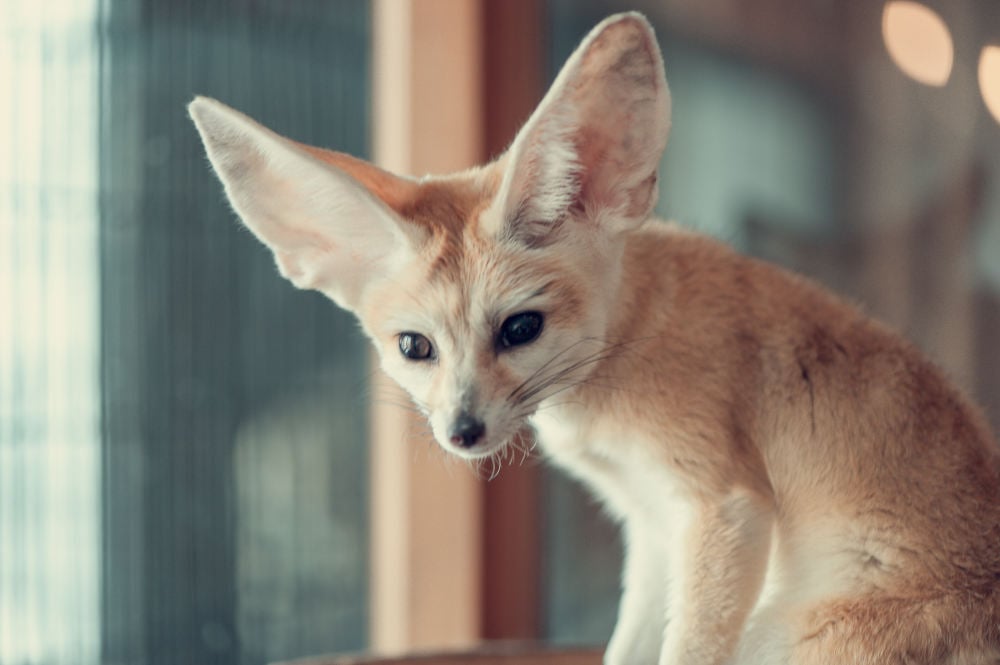Fennec foxes are known for their distinctive large ears and cute, playful personalities. As more people become interested in keeping exotic pets, Fennec foxes have become a popular choice for those looking for an unusual and unique companion animal. However, caring for a Fennec fox in captivity requires specialized knowledge and care to ensure its health and well-being.
In this article, we will provide a comprehensive guide to caring for a Fennec fox in captivity, including information on their diet, housing, and overall health requirements. By following these guidelines, you can help your Fennec fox thrive in captivity and provide them with the best possible care.
Background on Fennec Fox

The Fennec fox, also known as the desert fox, is a small nocturnal fox found in the Sahara of North Africa and the Sinai Peninsula. It is the smallest species of fox in the world, weighing only about 1.5-3.5 pounds and measuring about 9-16 inches in length. Their long bushy tails typically measure about 7 to 12 inches in length.
Fennec foxes have several unique adaptations that allow them to thrive in harsh desert environments. Their large ears, which measure up to 6 inches in length, help them regulate their body temperature by dissipating heat and also help them detect prey underground. They also have thick double-coated fur that insulates them from the heat and cold and large feet that allow them to walk on sand without sinking.
Fennec foxes are primarily insectivores but also eat small mammals, birds, and reptiles. They are known for their ability to survive without water for long periods of time, as they can get most of the moisture they need from their food.
Fennec foxes are social animals that live in family groups of up to ten individuals. They communicate with each other through a variety of vocalizations, including barks, yips, and whines. They are also known for their playful behavior and can often be seen chasing each other and engaging in mock fights.
Temperament
Fennec foxes are social animals and can be quite friendly and affectionate with their owners if they are raised in captivity from a young age. They may even enjoy being petted and cuddled.
However, they are also highly active and require a lot of stimulation, so they may not be the best pets for everyone. If they are not given enough attention and interaction, they can become bored and destructive.
Fennec foxes are known for their curious and playful personalities. They enjoy exploring their environment and playing with toys. They are also quite intelligent and, in some cases, can be trained to perform simple tricks, such as shaking hands or rolling over.
Though they are intelligent, sometimes partly because they are so energetic, a Fennec fox can't be bothered to sit still long enough to learn these kinds of things! And they would much rather be playing fetch with you or wrestling around with a stuffed animal.
Additionally, though they are tiny and cute, most Fennec foxes are not cuddly. They may learn to tolerate being picked up, but they'll likely want to get back to whatever they were doing right away. The best time to try to get some cuddles from a Fennec fox is when they are especially sleepy because then they may be more interested in cuddling up and being held!
Housing requirements
Indoor
It is possible to keep a Fennec Fox inside a home successfully. But they need constant supervision and a safe place to play. If you are just gone for a few hours and want to make sure your fox doesn't get into trouble, keeping it in a crate or kennel can be beneficial.
They need a cage or enclosure that is at least 4 feet by 4 feet and 6 feet high to allow them to move around freely. The enclosure should also have a secure top, as Fennec foxes are known to be excellent climbers.
Fennec foxes are also diggers, so the flooring of their enclosure should be solid and lined with a substrate such as sand or dirt to allow for digging. The enclosure should also have hiding places and platforms to climb on.
However, Fennec foxes are nocturnal, meaning they sleep through much of the day and are most active at night. To keep one inside and ensure that the fox isn't getting into trouble or mischievous during the night, it may be best to dedicate one entire room to the fox, like a spare bedroom, for example. Here you can supply the fox with climbing furniture, toys, a place to dig, and any other type of enrichment they may require without having to worry about your fox digging and tearing up your new couch.
Outdoor
If you live in an area where the temperatures don't get too chilly, even at night, it will be best to have an outdoor enclosure for your Fennec fox. They are adapted to live in hot desert temperatures and can even do well in lower temperatures as their native regions do get quite cold at night. However, warm weather is typically far preferable for them.
If you do choose to create an outdoor enclosure for a Fennec fox, it should be designed to protect them from extreme temperatures, predators, and escape. The enclosure should include an insulated, enclosed area with a heat source for warmth during colder months, plenty of shade, and a cooling area during hotter months.
The enclosure should be securely fenced with wire mesh or other sturdy material to prevent predators such as dogs and coyotes from entering. Fennec foxes are known for their digging abilities, so the enclosure should have an underground barrier or wire mesh to prevent escape. They also are quite the little jumpers, so their outdoor enclosure will need to be covered to ensure they can't escape.
Household Hazards
Unfortunately, Fennec foxes living in captivity are especially good at getting themselves into trouble! There are a few things to keep in mind when caring for a Fennec fox.
- • Use baby-proofing plugs or safety plugs on all exposed or unused outlets.
- • Try to avoid letting your Fennec fox slip into small places, like behind the fridge or in between the wall and the couch.
- • Keep any toxic items like bleach or laundry detergent up in a cupboard, ideally with a child safety lock installed.
Exercise requirements
Fennec foxes are small desert animals that require regular exercise to maintain their physical and mental health. They are highly active, and in the wild, they travel long distances each night in search of food and water.
Having a Fennec fox pet in captivity, it will be incredibly important to provide your Fennec fox with enough space and opportunities to exercise daily. A large, secure outdoor enclosure or indoor play area with plenty of climbing structures, tunnels, and toys is essential to keep your Fennec fox active and engaged.
To provide your Fennec fox with adequate exercise, give them enough space to play and run around. Their enclosure should be at least 4ft x 4ft x 8ft and have plenty of room for climbing structures and toys. Fennec foxes enjoy toys that allow them to mimic hunting behaviors, such as chew toys, balls, and puzzle toys that they can play with and chase around.
They also like climbing structures such as branches, perches, and platforms, as they are natural climbers and enjoy perching on high surfaces. Tunnels and hiding places are also important for Fennec foxes, as they enjoy burrowing and digging.
Some Fennec foxes can be trained to walk outside on a harness with you. But it is important to note that this may not be suitable for all Fennec foxes. Walking your Fennec fox on a leash can be a great way to provide them with additional exercise and mental stimulation, as well as give them the opportunity to explore new environments.
However, using a properly fitted harness and leash designed for small animals is important, as Fennec foxes have delicate necks that can be injured by a collar. It is also important to supervise them closely and avoid walking them in areas where they may encounter other animals or predators.
Before attempting to walk your Fennec fox on a leash, it is important to train them gradually and to use positive reinforcement techniques. Start by introducing the harness and leash to your Fennec fox gradually, allowing them to get used to the harness's feel and the leash's weight. Reward them with treats and praise for positive behaviors, such as walking calmly on the leash.
Food Requirements
In captivity, their diet can be replicated by providing a combination of high-quality commercial diets, insects, and small amounts of fruits and vegetables.
Commercial diets for Fennec foxes should be formulated to meet their specific nutritional needs, which include high protein and fat content, as well as a small amount of dog food or a commercial insectivore diet.
Fennec foxes also require a source of taurine, an amino acid found in meat, which can be provided through the commercial diet or by feeding small amounts of meat. A commercial diet commonly used for Fennec foxes is the Mazuri exotic canine diet which is specially designed with animals like wolves, coyotes, and foxes in mind.
Insects are a crucial part of a Fennec fox's diet, and they can be fed live or freeze-dried crickets, mealworms, and waxworms. In addition, small amounts of fruits and vegetables such as apples, carrots, and sweet potatoes can be offered as occasional treats.
House training
Fennec foxes can be house-trained, much like a cat or dog can be house-trained. They benefit from some of the same methods you would use to train a cat or dog to either use a litter box or to ask to go outside to go to the bathroom. That being said, though, Fennec Foxes are much more difficult to train than a cat or dog.
Though they can be kept in captivity, we mustn't forget that they are instinctively wild animals. For example, male Fennec foxes, upon reaching sexual maturity, have a tendency to mark their territory with urine. It is nearly impossible to train this behavior away, so it may be beneficial to neuter the animal.
Litter training will likely be your best bet, as Fennec foxes are natural diggers and burrowers, so they will enjoy digging and pawing at the litter. It may be best to get a covered litter box, though, so your fox isn't digging so much that litter is going flying everywhere!
Laws
Fennec fox ownership laws vary depending on the country, state, or province in which you live. In many places, Fennec foxes are considered exotic pets and may be subject to specific laws and regulations.
For example, in the United States, some states prohibit or restrict the ownership of Fennec foxes, while others allow them with a permit or license. It is important to check the specific laws in your state before owning a Fennec fox.
In some countries, such as Australia, Fennec foxes are classified as prohibited non-native animals and are not allowed to be kept as pets under any circumstances.
It is always a good idea to do thorough research and consult with local authorities before considering owning a Fennec fox to ensure you are complying with all laws and regulations in your area.
Enrichment
Enrichment is a key factor in owning and caring for a Fennec fox. To provide enrichment for your Fennec fox, you should create a suitable living environment large enough for them to move around and explore. Include hiding places and perches to climb on and natural substrates like sand and dirt that mimic their natural habitat.
Toys are essential for providing stimulation and enrichment to your Fennec fox. Offer different textures, shapes, and sizes of toys to encourage them to investigate and play. Some examples of toys include puzzle feeders, balls, stuffed animals, and chew toys.
Fennec foxes are natural scavengers, so providing opportunities for foraging can keep them mentally stimulated. Scatter their food around the enclosure, hide treats in toys, or even bury them in the substrate to encourage natural foraging behaviors.
Fennec foxes are social animals, so it is essential to allow for socialization. Consider getting a pair if possible or allowing them to interact with other foxes in a supervised setting.
Different scents and sounds can also provide enrichment to your Fennec fox. They have a strong sense of smell and enjoy different scents, such as herbs, spices, or natural oils. You can also provide different sounds, such as music or nature sounds.
Finally, encourage exploration by creating tunnels, tubes, or even cardboard boxes for your Fennec fox to climb in and out of. It is essential to provide a variety of enrichment activities to keep your Fennec fox happy and healthy. Always supervise any interactions with your fox to ensure their safety.
Social needs
Fennec foxes, like many animals, have social needs that must be met to maintain their physical and mental well-being. These social needs include companionship, communication, play, grooming, and territoriality.
Fennec foxes are social creatures and thrive in pairs or small groups, enjoying the company of their own kind. They use a variety of vocalizations, body language, and scent markings to communicate with each other, maintain social bonds, and find food.
Play is also an important aspect of their social behavior, allowing them to bond, learn new skills, and burn off excess energy. Grooming is used to establish hierarchy within the group and to keep their coats clean and free of parasites. Meeting these social needs by providing opportunities for social interaction, play, and communication, as well as suitable habitat, is essential to ensuring the health and happiness of a pet Fennec fox.
Neutering/spaying
One of the foremost reasons for spaying or neutering a Fennec fox kept in captivity is to modify its behaviors. Most Fennec foxes reach puberty around nine months of age. Once a Fennec fox reaches puberty, it can start to develop some really unpleasant behaviors and can even become aggressive.
Neutering male Fennec foxes can help reduce aggressive or territorial behavior while spaying female Fennec foxes can prevent heat cycles and associated behaviors like marking.
Spaying and neutering are common procedures performed on domestic animals, but when it comes to exotic animals like Fennec foxes, there are additional considerations to take into account.
However, it's important to note that the procedure should only be performed by a licensed and experienced veterinarian who is familiar with exotic animal medicine. The anesthesia protocol for a Fennec fox can be challenging, as they are small and can be sensitive to certain medications.
Common health concerns
Fennec foxes, when kept as pets, can face a range of health concerns. While they are generally healthy in the wild, Fennec foxes can develop dental problems, such as overgrown teeth or tooth decay, if their diet is not balanced. Additionally, they may contract parasites, including fleas, ticks, mites, and worms, which can cause skin irritation, anemia, and weight loss.
Fennec foxes can easily become overweight if they are not given enough exercise and are fed an inappropriate diet, which can lead to health problems such as diabetes, heart disease, and joint problems.
They can also suffer from heat stroke if they are kept in environments that are too hot and humid. Finally, respiratory infections can occur if they are kept in poorly ventilated environments or if they are exposed to other animals carrying respiratory viruses. And, of course, like any animal, Fennec foxes can suffer from ailments like heart disease, liver disease, and kidney disease.
Veterinary care
One of the most important things to consider before you bring a Fennec fox home is to find an exotic veterinarian near you that is willing to treat your Fennec fox. Sometimes it can be difficult to find an exotic veterinarian, let alone find an exotic veterinarian who is willing and capable of treating a Fennec fox.
Before bringing one home, you must have veterinary care lined up. Fennec foxes are much like dogs and cats as far as their healthcare goes. They benefit greatly from regular check-ups with a veterinarian as well as preventative care like flea and tick prevention and heartworm preventative.
Fun facts
- • Fennec foxes are monogamous animals, meaning they mate for life and live in small family groups.
- • Fennec foxes have thick fur on the soles of their feet, which helps them walk on hot sand without getting burned.
- • Fennec foxes have been known to use a variety of vocalizations to communicate with each other, including barks, yelps, and whines.
- • They are known to be very agile and can jump up to 3 feet in the air, which helps them catch prey.
- • The Fennec fox is the smallest fox in the world.
- • They like to purr sometimes, just like a cat.
- • Their body has evolved in such a way that they are able to function without drinking much water, and instead, they can absorb most of it from the food they eat.
- • The Fennec fox is the national animal of Algeria.
- • The underground dens they dig can be as big as 1,291 sq. feet.
- • The Fennec fox is different from many other fox species in that they don't have a musk gland and, therefore, lacks that distinctive smell.
- • Fennec foxes are born with their ears folded over. After about ten days, the ears will start to unfold.
Conclusion
In conclusion, caring for a Fennec fox in captivity requires a lot of patience, dedication, and effort. These adorable and curious creatures need a suitable habitat, a nutritious and balanced diet, and plenty of opportunities for physical and mental stimulation. Providing proper care for a Fennec fox also involves regular veterinary check-ups and grooming, as well as socialization and training.
It is essential to remember that owning a Fennec fox is a long-term commitment and requires a significant amount of time, resources, and attention. By following these guidelines, you can ensure that your Fennec fox lives a healthy, happy, and fulfilling life in captivity.
FAQ
What Do Fennec Foxes Eat?
Fennec foxes are omnivores and their diet primarily consists of insects, small rodents, lizards, and birds. They are also known to eat fruits and vegetables when available, and may even scavenge on carrion if necessary.
How many fennec foxes are left in the wild?
The exact population of fennec foxes in the wild is not known, but they are not considered to be endangered or threatened. They are listed as a species of "Least Concern" by the International Union for Conservation of Nature (IUCN) due to their wide distribution across North Africa and the Arabian Peninsula and their adaptability to live in different habitats.
Where does fennec fox live?
Fennec foxes are found in the Sahara Desert, the Sinai Peninsula, and the Arabian Desert. They are distributed across North Africa and the Arabian Peninsula, including countries such as Algeria, Egypt, Libya, Mauritania, Morocco, Niger, Chad, Sudan, Tunisia, and Mali, as well as in parts of Israel, Jordan, and Saudi Arabia.
Can Fennec Foxes Live in Cold Weather?
Fennec foxes are adapted to live in hot desert environments, and they are not well-suited for cold weather. They have a thick fur coat that helps them to stay warm at night when temperatures can drop significantly, but they are not adapted to survive in temperatures that consistently drop below freezing.
Can fennec foxes swim?
While fennec foxes are good at navigating through sand and rocky terrain, they are not adapted for swimming. They are primarily land animals and do not have the physical adaptations that allow them to swim efficiently.






